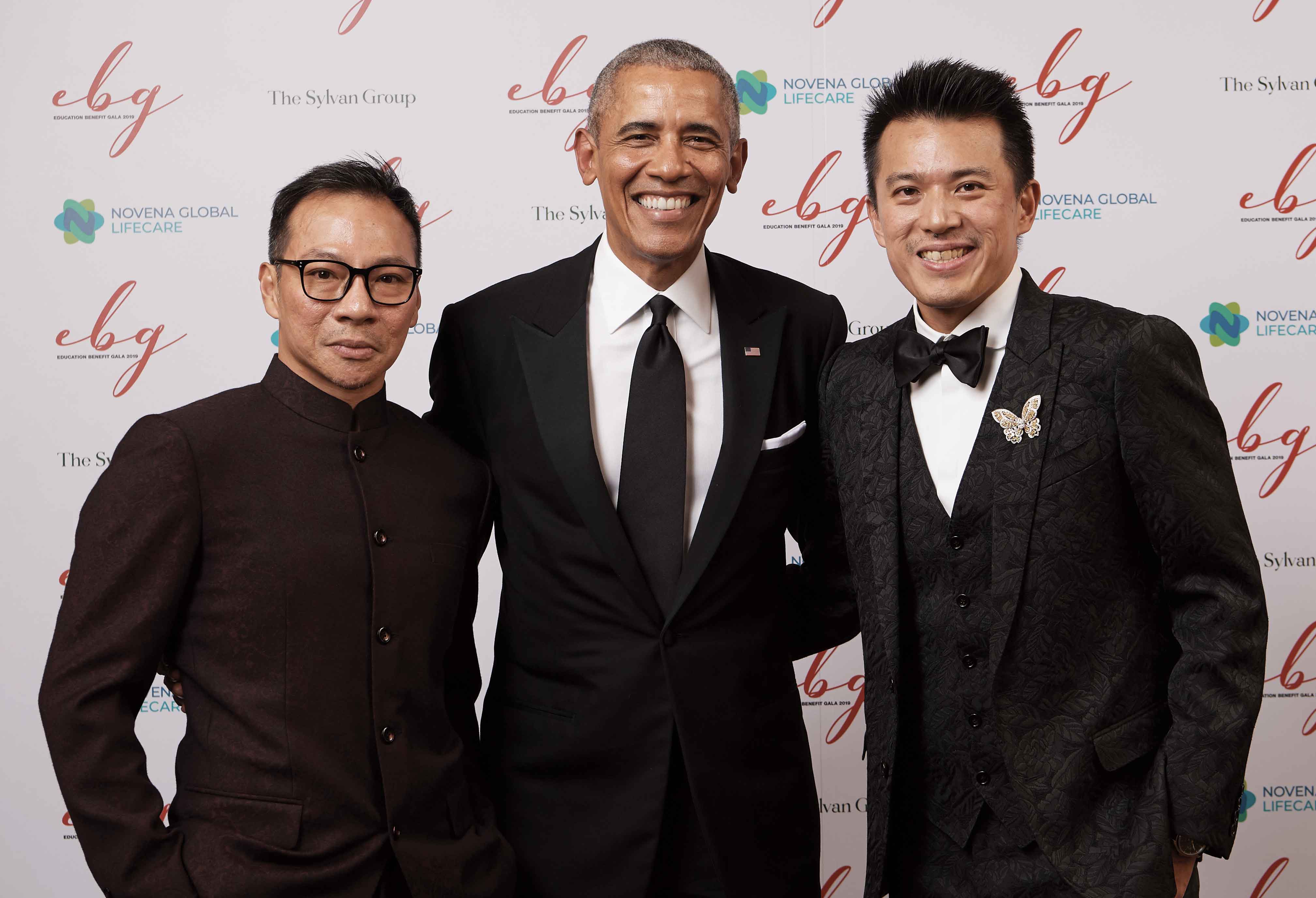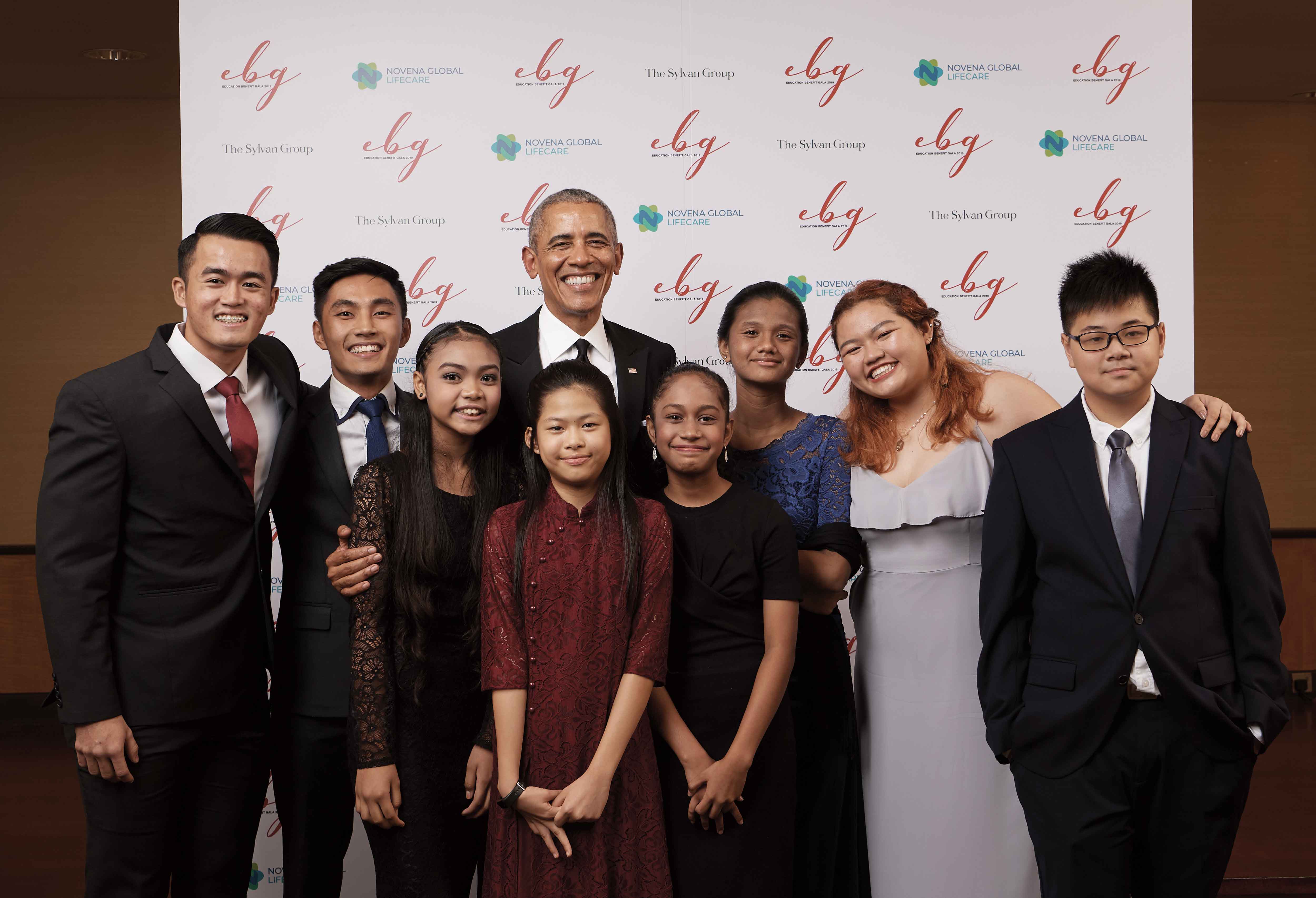INVESTMENT
Barack Obama shared these wise words at Singapore's Education Gala
28 Mar 2020
In Singapore for the Education Benefit Gala last December, former U.S. president Barack Obama charmed the audience with personal stories peppered with delightful wit as he spoke about leadership, future-proofing the workforce, and that elusive work-life balance.
The private charity event, organized by Novena Global Lifecare healthcare and aesthetics group and held at The Ritz-Carlton, Millenia Singapore, featured a moderated dialogue session in which the 44th president of the United States spoke about the global economy, climate change, the evolving mediascape, and the call for more diversity — in society and in the workplace. Here are some excerpts.
- ON FUTURE-PROOFING THE LABOR FORCE
- ON EMPOWERING MORE FEMALE LEADERS
- ON WORK-LIFE BALANCE
- ON BRIDGING INEQUALITY AN RESOLVING ENVIRONMENTAL CHALLENGES
“We live in a knowledge-based age and so the most important skills are going to be ones that involve work between the ears rather than using your hands. Everybody has understood this for quite some time. Some countries have adapted better, some worse, but this will accelerate much faster than we’ve ever seen.
“Essentially, anything that is repeatable will be done by a machine. There are certain things humans cannot compete with, and it’s not just factory work.
“What that means is that we have to then retrain, redesign and revalue those unique things that humans can do that machines cannot do. A machine cannot spark a sense of self-worth and inspiration in a child the way a teacher can. And yet, we pay teachers miserably compared to some other professions.
“In healthcare, there are some things a machine should do because they do it better but the ability to nurse someone and care for them, those are examples of occupations that we currently undervalue but that’s actually going to be the thing humans [ought to] do.
“And we’re going to have to train our kids to be creative with machines and to help people to use at the highest levels as tools the ways in which machines themselves cannot do. That's going to be what’s in greatest demand.
“But even if we do all these things, societies are probably going to have to reexamine how work is distributed, and how goods and services are distributed because there are not going to be enough jobs for everyone.”
 Barack Obama with (from left) Terence Loh and Nelson Loh, co-founders of Novena Global Lifecare, Dorr Group and The LOH Foundation
Barack Obama with (from left) Terence Loh and Nelson Loh, co-founders of Novena Global Lifecare, Dorr Group and The LOH Foundation
- ON FUTURE-PROOFING THE LABOR FORCE
- ON EMPOWERING MORE FEMALE LEADERS
- ON WORK-LIFE BALANCE
- ON BRIDGING INEQUALITY AN RESOLVING ENVIRONMENTAL CHALLENGES
On empowering more female leaders
“The basic notion [in most societies] still is, even if you’re applying to the best colleges, we still want [women] to just find a man. And the work we all have to do is to fight against those attitudes and to counteract them.
“Young women have as much talent and the right to do anything they want as our sons do. That’s a message we have to not only all incorporate into our own lives in how we raise our sons, in how we raise our daughters, but has to also be institutionalized in every institution.
“And it’s interesting from a business perspective. This is not charity. Any society that’s leaving women out is leaving half the pool of talent off the field.
“It’s also true of businesses; you will be less successful. Several studies have shown that the stock performance of companies that have a significant number of women in their leadership outperform companies that don’t.
“Part of it is because not only do you have a larger pool of talent to draw from, but you’re also bringing different perspectives, ideas and wisdom, and this is why diversity of leadership at the top of organisations is so important.
“I always used to insist on having a wide range of viewpoints in order for me to solve a problem. Because the best way to solve a problem is if you have the best data available and you have the widest range of potential solutions and perspectives sitting around the table problem solving.
“Otherwise, you will have blind spots and groupthink, and you will fail to see all the possibilities and you’ll make worse decisions. What’s true in government is also true in business.”
- ON FUTURE-PROOFING THE LABOR FORCE
- ON EMPOWERING MORE FEMALE LEADERS
- ON WORK-LIFE BALANCE
- ON BRIDGING INEQUALITY AN RESOLVING ENVIRONMENTAL CHALLENGES
On work-life balance
“It’s interesting that during the [Obama Foundation] young leader’s summit that we just had in Kuala Lumpur, one of the issues that came up the most was the question of people trying to figure out that balance.
“Obviously, because of social roles, oftentimes this burdens young women more than men, but men need to step up.
“Part of the answer is also recognizing you can have it all but maybe not all at the same time. So, there are times where you are pursuing your ambitions and you’re trying to make something happen… like getting elected president, and that becomes the family project.
“And there are times where the family is the project and you have to recognize that your priorities will shift over time during the course of your lives.”

- ON FUTURE-PROOFING THE LABOR FORCE
- ON EMPOWERING MORE FEMALE LEADERS
- ON WORK-LIFE BALANCE
- ON BRIDGING INEQUALITY AN RESOLVING ENVIRONMENTAL CHALLENGES
On bridging inequality an resolving environmental challenges
“When, as a society, you’re more focused on making sure every child gets an education, and everybody gets an opportunity, and people who are sick are getting better, and the oceans are clean, and the air we can breathe, and we’re reducing the chances of war, that’s a gift that just keeps on giving.
“Reorienting ourselves along those lines is probably going to be what will lead us out of our current challenges. And that will require not just technical changes but us becoming wiser as a society about what’s important to us.”






 Back
Back
